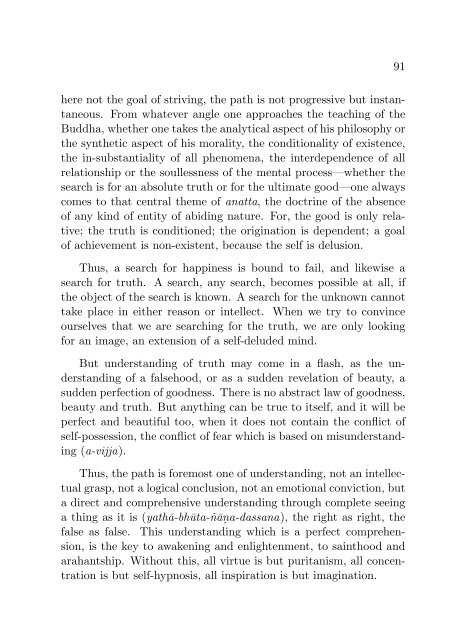Problems Bared, Essays on Buddhism
Essays on various aspects of the Buddha’s teaching.
Essays on various aspects of the Buddha’s teaching.
Create successful ePaper yourself
Turn your PDF publications into a flip-book with our unique Google optimized e-Paper software.
91<br />
here not the goal of striving, the path is not progressive but instantaneous.<br />
From whatever angle <strong>on</strong>e approaches the teaching of the<br />
Buddha, whether <strong>on</strong>e takes the analytical aspect of his philosophy or<br />
the synthetic aspect of his morality, the c<strong>on</strong>diti<strong>on</strong>ality of existence,<br />
the in-substantiality of all phenomena, the interdependence of all<br />
relati<strong>on</strong>ship or the soullessness of the mental process—whether the<br />
search is for an absolute truth or for the ultimate good—<strong>on</strong>e always<br />
comes to that central theme of anatta, the doctrine of the absence<br />
of any kind of entity of abiding nature. For, the good is <strong>on</strong>ly relative;<br />
the truth is c<strong>on</strong>diti<strong>on</strong>ed; the originati<strong>on</strong> is dependent; a goal<br />
of achievement is n<strong>on</strong>-existent, because the self is delusi<strong>on</strong>.<br />
Thus, a search for happiness is bound to fail, and likewise a<br />
search for truth. A search, any search, becomes possible at all, if<br />
the object of the search is known. A search for the unknown cannot<br />
take place in either reas<strong>on</strong> or intellect. When we try to c<strong>on</strong>vince<br />
ourselves that we are searching for the truth, we are <strong>on</strong>ly looking<br />
for an image, an extensi<strong>on</strong> of a self-deluded mind.<br />
But understanding of truth may come in a flash, as the understanding<br />
of a falsehood, or as a sudden revelati<strong>on</strong> of beauty, a<br />
sudden perfecti<strong>on</strong> of goodness. There is no abstract law of goodness,<br />
beauty and truth. But anything can be true to itself, and it will be<br />
perfect and beautiful too, when it does not c<strong>on</strong>tain the c<strong>on</strong>flict of<br />
self-possessi<strong>on</strong>, the c<strong>on</strong>flict of fear which is based <strong>on</strong> misunderstanding<br />
(a-vijja).<br />
Thus, the path is foremost <strong>on</strong>e of understanding, not an intellectual<br />
grasp, not a logical c<strong>on</strong>clusi<strong>on</strong>, not an emoti<strong>on</strong>al c<strong>on</strong>victi<strong>on</strong>, but<br />
a direct and comprehensive understanding through complete seeing<br />
a thing as it is (yathā-bhūta-ñāṇa-dassana), the right as right, the<br />
false as false. This understanding which is a perfect comprehensi<strong>on</strong>,<br />
is the key to awakening and enlightenment, to sainthood and<br />
arahantship. Without this, all virtue is but puritanism, all c<strong>on</strong>centrati<strong>on</strong><br />
is but self-hypnosis, all inspirati<strong>on</strong> is but imaginati<strong>on</strong>.

















